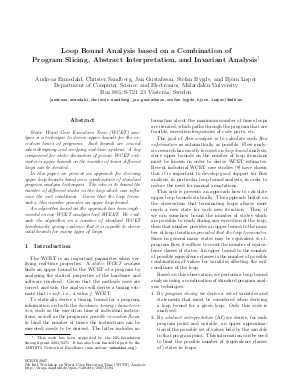Loop Bound Analysis based on a Combination of Program Slicing, Abstract Interpretation, and Invariant Analysis
Authors Andreas Ermedahl, Christer Sandberg, Jan Gustafsson, Stefan Bygde, Björn Lisper
-
Part of:
Volume:
7th International Workshop on Worst-Case Execution Time Analysis (WCET'07) (WCET 2007)
Part of: Series: Open Access Series in Informatics (OASIcs)
Part of: Conference: Workshop on Worst-Case Execution Time Analysis (WCET) - License:
 Creative Commons Attribution-NonCommercial-NoDerivs 3.0 Unported license
Creative Commons Attribution-NonCommercial-NoDerivs 3.0 Unported license
- Publication Date: 2007-11-13
File

PDF
OASIcs.WCET.2007.1194.pdf
- Filesize: 166 kB
- 6 pages
Document Identifiers
Subject Classification
Keywords
- WCET analysis
- loop-bound analysis
- program slicing
- abstract interpretation
- invariant analysis
Metrics
- Access Statistics
-
Total Accesses (updated on a weekly basis)
0Document
0Metadata
Abstract
Static Worst-Case Execution Time (WCET) analysis is a technique to derive upper bounds for the execution times of programs. Such bounds are crucial when designing and verifying real-time systems. A key component for static derivation of precise WCET estimates is upper bounds on the number of times different loops can be iterated. In this paper we present an approach for deriving upper loop bounds based on a combination of standard program analysis techniques. The idea is to bound the number of different states in the loop which can influence the exit conditions. Given that the loop terminates, this number provides an upper loop bound. An algorithm based on the approach has been implemented in our WCET analysis tool SWEET. We evaluate the algorithm on a number of standard WCET benchmarks, giving evidence that it is capable to derive valid bounds for many types of loops.
Cite As Get BibTex
Andreas Ermedahl, Christer Sandberg, Jan Gustafsson, Stefan Bygde, and Björn Lisper. Loop Bound Analysis based on a Combination of Program Slicing, Abstract Interpretation, and Invariant Analysis. In 7th International Workshop on Worst-Case Execution Time Analysis (WCET'07). Open Access Series in Informatics (OASIcs), Volume 6, pp. 1-6, Schloss Dagstuhl – Leibniz-Zentrum für Informatik (2007)
https://doi.org/10.4230/OASIcs.WCET.2007.1194
BibTex
@InProceedings{ermedahl_et_al:OASIcs.WCET.2007.1194,
author = {Ermedahl, Andreas and Sandberg, Christer and Gustafsson, Jan and Bygde, Stefan and Lisper, Bj\"{o}rn},
title = {{Loop Bound Analysis based on a Combination of Program Slicing, Abstract Interpretation, and Invariant Analysis}},
booktitle = {7th International Workshop on Worst-Case Execution Time Analysis (WCET'07)},
pages = {1--6},
series = {Open Access Series in Informatics (OASIcs)},
ISBN = {978-3-939897-05-7},
ISSN = {2190-6807},
year = {2007},
volume = {6},
editor = {Rochange, Christine},
publisher = {Schloss Dagstuhl -- Leibniz-Zentrum f{\"u}r Informatik},
address = {Dagstuhl, Germany},
URL = {https://drops.dagstuhl.de/entities/document/10.4230/OASIcs.WCET.2007.1194},
URN = {urn:nbn:de:0030-drops-11946},
doi = {10.4230/OASIcs.WCET.2007.1194},
annote = {Keywords: WCET analysis, loop-bound analysis, program slicing, abstract interpretation, invariant analysis}
}
